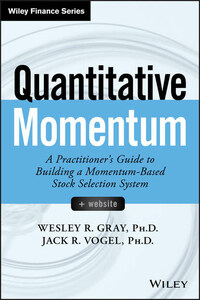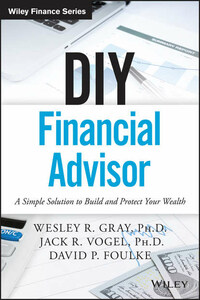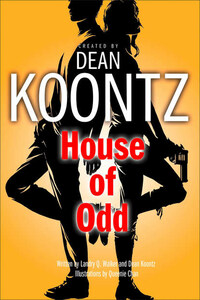Founded in 1807, John Wiley & Sons is the oldest independent publishing company in the United States. With offices in North America, Europe, Australia and Asia, Wiley is globally committed to developing and marketing print and electronic products and services for our customers' professional and personal knowledge and understanding.
The Wiley Finance series contains books written specifically for finance and investment professionals, as well as sophisticated individual investors and their financial advisers. Book topics range from portfolio management to e-commerce, risk management, financial engineering, valuation and financial instrument analysis, as well as much more.
For a list of available titles, visit our website at www.WileyFinance.com.
Copyright © 2016 by Wesley R. Gray and Jack R. Vogel. All rights reserved.
Published by John Wiley & Sons, Inc., Hoboken, New Jersey.
Published simultaneously in Canada.
No part of this publication may be reproduced, stored in a retrieval system, or transmitted in any form or by any means, electronic, mechanical, photocopying, recording, scanning, or otherwise, except as permitted under Section 107 or 108 of the 1976 United States Copyright Act, without either the prior written permission of the Publisher, or authorization through payment of the appropriate per-copy fee to the Copyright Clearance Center, Inc., 222 Rosewood Drive, Danvers, MA 01923, (978) 750-8400, fax (978) 646-8600, or on the Web at www.copyright.com. Requests to the Publisher for permission should be addressed to the Permissions Department, John Wiley & Sons, Inc., 111 River Street, Hoboken, NJ 07030, (201) 748-6011, fax (201) 748-6008, or online at http://www.wiley.com/go/permissions.
Limit of Liability/Disclaimer of Warranty: While the publisher and author have used their best efforts in preparing this book, they make no representations or warranties with respect to the accuracy or completeness of the contents of this book and specifically disclaim any implied warranties of merchantability or fitness for a particular purpose. No warranty may be created or extended by sales representatives or written sales materials. The advice and strategies contained herein may not be suitable for your situation. You should consult with a professional where appropriate. Neither the publisher nor author shall be liable for any loss of profit or any other commercial damages, including but not limited to special, incidental, consequential, or other damages.
For general information on our other products and services or for technical support, please contact our Customer Care Department within the United States at (800) 762-2974, outside the United States at (317) 572-3993 or fax (317) 572-4002.
Wiley publishes in a variety of print and electronic formats and by print-on-demand. Some material included with standard print versions of this book may not be included in e-books or in print-on-demand. If this book refers to media such as a CD or DVD that is not included in the version you purchased, you may download this material at http://booksupport.wiley.com. For more information about Wiley products, visit www.wiley.com.
Library of Congress Cataloging-in-Publication Data:
Names: Gray, Wesley R., author. | Vogel, Jack R., 1983- author.
Title: Quantitative momentum: a practitioner’s guide to building a momentum-based stock selection system / Wesley R. Gray, Jack R. Vogel.
Description: Hoboken, New Jersey: John Wiley & Sons, Inc., [2016] | Series: Wiley finance series | Includes index.
Identifiers: LCCN 2016023789 (print) | LCCN 2016035370 (ebook) | ISBN 9781119237198 (cloth) | ISBN 9781119237266 (pdf) | ISBN 9781119237259 (epub)
Subjects: LCSH: Stocks. | Investments. | Technical analysis (Investment analysis)
Classification: LCC HG4661 .G676 2016 (print) | LCC HG4661 (ebook) | DDC 332.63/2042 – dc23
LC record available at https://lccn.loc.gov/2016023789
Cover image: Wiley
Cover design: © Frank Rohde/Shutterstock









